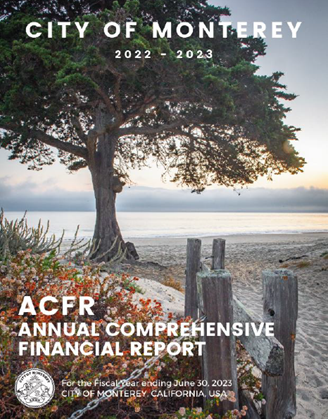Finance
Welcome to your online guide to the Finance Department. Here's our latest Annual Comprehensive Financial Reportfor fiscal year ending June 30, 2023, and the final Adopted Operating Budget, starting July 1, 2023. Monterey City Council adopted the Budget for fiscal year 2023-2024 at the June 6, 2023 Council Meeting.
We are responsible for managing and executing all of the financial management functions for the City. Information includes the City's Annual Comprehensive Financial Report, City fees and charges, budget data for the current year and prior years, and City ordinances pertaining to the Business License Tax, Visitor Accommodation Facilities Tax, including Transient Occupancy Tax (TOT), and Utility Users Tax.
Hotel Tax: Effective January 1, 2021, the City of Monterey Hotel Tax rate is 12%. (See resolution)
Sales Tax: Effective July 1, 2020, the City of Monterey Sales Tax rate is 9.25%.
- State of California base sales and use tax rate is 7.25%
- Measure S enacted a 1% sales tax, effective from April 1, 2019 through March 31, 2027
- Measure G voters approved a .5% sales tax in March 2020, effective July 1, 2020 through June 30, 2029
- Measure X enacted a .375% Transportation Safety and Investment Plan sales tax – for more information contact TAMC directly
- Monterey-Salinas Transit’s .125% district tax– for more information contact MST directly
If you are starting a business in Monterey, you can easily apply online or complete the fillable business license application form and return the form to the Revenue Office. A business license tax calculator is provided to compute the business license tax for you.
FINANCE ADMINISTRATION
The Finance Administration section is responsible for the overall management and supervision of the Finance Department divisions and specific programs briefly discussed below. This section is also responsible for the Purchasing function which includes ensuring compliance with formal bid requirements, processing of all City purchase orders, and the development and maintenance of purchasing polices and procedures published in the Purchasing Policies and Procedures Manual. In addition, the Budget function falls under the purview of Finance Administration. This includes the coordination of the budget development process, budget control and compliance, developing and publishing of budget reports and documents, long range financial planning and forecasting.
Finance works closely with the City Manager for guidance in the coordination of the budget processes and development of budgetary policies and procedures.
ACCOUNTING
The programs included in this division are General Accounting, Accounts Payable and Payroll Administration.
The General Accounting functions involve the accounting for expenditures, revenues, and other transactions in accordance with Generally Accepted Accounting Principles, including the preparation of various financial reports and audits.
The Accounts Payable function ensures that all City bills and invoices are paid accurately and in a timely manner, consistent with all applicable federal, state, and local laws and regulations.
The Payroll Administration function is responsible for the accurate and timely paying of salaries and other benefits to City employees as well as maintaining accurate records pertaining to payroll-related information.
REVENUE
The Revenue Division is responsible for the receipt and accounting of all monies received by the City. The treasury function involves the daily reconciliation of bank activity and investment of excess funds at reasonable rates while ensuring that funds are available as needed. Business License Administration also falls under the Revenue Division. This entails the enforcement of the business license ordinance on all businesses doing business within the City of Monterey, maintaining accurate records, and annually coordinating the license renewal process.
Monterey businesses with minimum rent are required to complete a quarterly percentage report. Mail report along with remittance to the Revenue office.
Dog licenses are processed by the Revenue office. Download a dog license application in fillable Adobe PDF format. See dog fee schedule for correct amount. Complete a separate dog license applications for each dog.
The Revenue Audit program encompasses both field and mail audits for purposes of verifying business license tax collections, transient occupancy tax, and rental revenue collections. This also involves performing monthly reconciliation with the Accounting Division to verify that all funds are properly debited and credited and that all bank balances are accurate.
The Revenue Collections function is responsible for tracking and collecting the amounts that are due to the City. This involves the maintenance of accurate accounts receivables, disbursement of timely and accurate billings, and following up on collections of past due accounts.
RISK MANAGEMENT
Risk Management - Risk Management is responsible for all property and casualty risk financing, including purchase of insurance; identifying and assessing the City's loss exposure; implementing loss prevention practices; monitoring and enforcing contractor and tenant compliance with City insurance requirements; and adjusting property and liability claims.
The Risk Manager serves as the City's representative to ACCEL, the Authority for California Cities Excess Liability. This is the insurance joint powers authority to which the City belongs, and is the quasi-government organization through which the City finances the majority of its liability exposure.
- Risk Management Q&A
- Risk Management Policy (pending update)
- Certificate of Self-Insurance
If you allege that the City or its employee has caused damage to your property, you will need to file a Claim Form and provide a receipt, or estimate(s) supporting the amount of damage claimed. It will be your responsibility to get your property repaired; the City's role will be limited to only paying for claims for which it is legally liable.

 Twitter
Twitter instagram
instagram youtube
youtube linkedin
linkedin Threads
Threads



